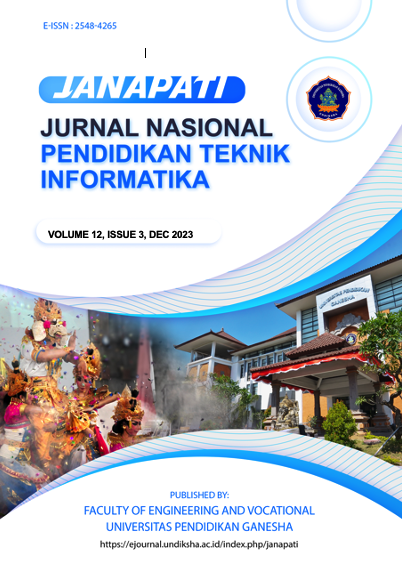Improving the Performance of the General Course Scheduling System at UPN Veteran Jawa Timur through the Application of the IWCFPSO Algorithm
DOI:
https://doi.org/10.23887/janapati.v12i3.68128Keywords:
best scheduling, Modified Particle Swarm Optimization, inertia weightAbstract
Algorithm selection is the main key in producing a system, especially an artificial intelligence-based system, for example, a course scheduling system that involves many constraints in producing an optimal schedule. This research develops a scheduling system using the ICWFPSO algorithm which is a development from previous research, namely the development of a scheduling system using the MIPSO algorithm. The use of inertia weight in the MIPSO algorithm which is used as a scheduling algorithm in previous research can be optimized by using a combination of inertia weight and constriction factor. Scheduling system development is carried out using the waterfall method with research steps namely problem and needs analysis, data collection and literature study, system design, system implementation, and ends with testing the performance of the algorithms that are applied to the scheduling system that is built. Based on the tests carried out, it can be concluded that the ICWFPSO algorithm provides 2 times better performance compared to the MIPSO algorithm in terms of optimal schedule generation time. Meanwhile, tests carried out on CPU and RAM usage showed that there was no significant impact on these two parameters through the implementation of MIPSO and ICWFPSO in the course scheduling system created.
Keywords: best scheduling, ICWFPSO, number of iterations
References
S. Kanata, Sarjiya and S. P. Hadi, "Modified Improved Particle Swarm Optimization (MIPSO) sebagai Solusi Economic Dispatch pada Sistem Kelistrikan 500 kV Jawa-Bali," Transmisi: Jurnal Ilmiah Teknik Elektro, vol. 15, no. 2, pp. 66-72, 2013.
M. H. P. Swari, C. A. Putra, Handika and I. P. S, "Analisis Perbandingan Algoritma Genetika dan Modified Improved Particle Swarim Optimization dalam Penjadwalan Mata Kuliah," Jurnal Janapati, vol. 11, no. 2, 2022.
S. Kanata, "Kombinasi Inertia Weight dan Constriction Factor pada Particle Swarm Optimization sebagai Solusi Pembangkitan Ekonomi pada Sistem Tenaga IEEE 26 Bus," Jurnal Electrans, vol. 12, no. 2, 2013.
U. Saeed and A. M. Amjad, "ISTQB: Black Box testing Strategies used in Financial Industry for Functional testing," School of Engineering Blekinge Institute of Technology, Sweden, 2009.
A. S. Ashour and Y. G. In, Optimization-Based Neutrosophic Set in Computer-Aided Diagnosis, Elsevier Inc. All, 2020.
M. Ram and J. P. Davim, Mathematics Applied to Engineering, Elsevier, 2017.
Y. Shi and R. Eberhart, "A Modified Particle Swarm Optimizer," in IEEE International Conference Evolution Computation, 1998.
M. Clerc, "The Swarm and The Queen : Towards a Deterministic and Adaptive Particle Swarm Optimization," in Congress on Evalutiory Computation, Washington, 1999.
R. Eberhart and Y. Shi, "Comparing Inertia Weight and Constriction Factors in Particle Swarim Optimizartion," in Proceeding of the 2000 Congress on Evalutionary Computation, 2000.
S. Herawati, Y. D. P. Negara, H. F. Febriyansyah and D. A. Fatah, "Application of the Waterfall Method on a Web-Based Job Training Management Information System at Trunojoyo University Madura," in E3S Web of Conferences, 2021.
I. G. I. Sudipa, Metode Penelitian Bidang Ilmu Informatika (Teori & Referensi Berbasis Studi Kasus), Jambi: PT. Sonpedia Publishing Indonesia, 2023.
R. Pressman, Rekayasa Perangkat Lunak (Pendekatan Praktisi), Yogyakarta: ANDI, 2012.
F. P. Putra and D. Enda, "Model Design for Grammatical Error Identification in Software Requirements Specification using Statistics and Rule-Based Techniques," in J. Phys.: Conf. Ser, 2020.
D. Enda and D. Siahaan, "Rekomendasi Perbaikan Pernyataan Kebutuhan yang Rancu dalam Spesifikasi Kebutuhan Perangkat Lunak Menggunakan Teknik Berbasis Aturan," Jurnal Teknologi Informasi dan Ilmu Komputer (JTIIK), vol. 5, no. 2, pp. 207-215, 2018.
J. W. Satzinger, R. B. Jackson and S. D. Burd, Systems Analysis and Design in a Changing World, 7/E., New York: Cengage Learning, 2016.
b. B. Naik, P. C. Raju and S. S. Rao, "A Constriction Factor Based Particle Swarm Optimization for Congestion Management in Transmission Systems," International Journal on Electrical Engineering and Informatics, vol. 10, no. 2, pp. 232-241, 2018.
L. C. Hermawan, M. R. Mubarok, H. Mairudin and A. Mahdiyan, "Pengujian Black Box pada Aplikasi Verifikasi Data Nasabah dengan Menggunakan Metode Boundary Value Analysis," Jurnal Teknologi Sistem Informasi dan Aplikasi, vol. 3, no. 3, 2020.
M. E. Khan, "Different Approaches to Black Box Testing Technique for Finding Errors," International Journal of Software Engineering & Applications (IJSEA), vol. 2, no. 4, pp. 31-40, 2011.
Downloads
Published
How to Cite
Issue
Section
License
Copyright (c) 2024 Made Hanindia Prami Swari, Chrystia Aji Putra, I Putu Susila Handika, Dwi Wahyuningtyas

This work is licensed under a Creative Commons Attribution-ShareAlike 4.0 International License.
Authors who publish with Janapati agree to the following terms:- Authors retain copyright and grant the journal the right of first publication with the work simultaneously licensed under a Creative Commons Attribution License (CC BY-SA 4.0) that allows others to share the work with an acknowledgment of the work's authorship and initial publication in this journal
- Authors are able to enter into separate, additional contractual arrangements for the non-exclusive distribution of the journal's published version of the work (e.g., post it to an institutional repository or publish it in a book), with an acknowledgment of its initial publication in this journal.
- Authors are permitted and encouraged to post their work online (e.g., in institutional repositories or on their website) prior to and during the submission process, as it can lead to productive exchanges, as well as earlier and greater citation of published work. (See The Effect of Open Access)







